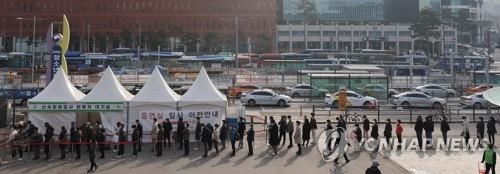- California Assembly OKs highest minimum wage in nation
- S. Korea unveils first graphic cigarette warnings
- US joins with South Korea, Japan in bid to deter North Korea
- LPGA golfer Chun In-gee finally back in action
- S. Korea won’t be top seed in final World Cup qualification round
- US men’s soccer misses 2nd straight Olympics
- US back on track in qualifying with 4-0 win over Guatemala
- High-intensity workout injuries spawn cottage industry
- CDC expands range of Zika mosquitoes into parts of Northeast
- Who knew? ‘The Walking Dead’ is helping families connect
New cases below 400,000 for second day; concerns linger over spike amid eased curbs
South Korea reported fewer than 400,000 new cases for the second day in a row Friday as the omicron variant tightens its grip on the country.
The country reported 339,514 new infections as of midnight, raising the total caseload to 11,162,232, the Korea Disease Control and Prevention Agency (KDCA) said.

People stand in line to take coronavirus tests at a screening clinic in front of Seoul Station on March 25, 2022. South Korea reported fewer than 400,000 new cases for the second day in a row as the omicron variant tightens its grip on the country. (Yonhap)
An average of 357,881 new COVID patients was confirmed over the past one week, compared with a corresponding figure of 404,944 a week earlier, the KDCA said.
Yet, the number is still higher than the corresponding figure of 266,327 reported two weeks earlier, it said.
Friday’s daily tally was down from 395,597 on Thursday and 490,881 on Wednesday, which was the second-highest daily caseload.
The death toll from COVID-19 came to 14,294, up 393 from Thursday, the KDCA said. The fatality rate came to 0.13 percent.
The number of critically ill patients stood at 1,085, up four from the previous day.
The daily tally has remained over 1,000 for 18 days straight.
As of 6 p.m., the country had added 259,192 new COVID-19 cases, down 10,436 from the same time the previous day, according to health authorities and city governments.
Daily cases are counted until midnight and announced the following morning.
South Korea is experiencing the worst wave of the pandemic, surpassing the grim milestone of 10 million infections earlier this week. Nearly 9 million cases have been reported since early February. The daily caseload surged to an all-time high of 621,205 last Thursday.
The spread of the virus is feared to continue unabated amid relaxed social distancing rules and quarantine rules for overseas entrants. Earlier this week, the government eased some of its virus-related regulations to support retail and service sectors bearing the brunt of the pandemic’s financial impact.
Health authorities have warned “stealth omicron” could continue to fuel a surge in infections despite earlier projections that the current wave could peak around this week. The subvariant is known to be more transmissible than the omicron variant.
Amid rapid outbreaks among young children, the government has rolled out a vaccination program for children aged 5-11. Parents became able to make reservations for a COVID-19 shot Thursday, and vaccinations will begin next Thursday nationwide.
Another child aged 9 or under died from COVID-19 on Thursday, bringing the total caseload to nine, the KDCA said.
An additional 43,900 doses of Pfizer Inc.’s antiviral pills, Paxlovid, arrived in the country earlier in the day. The pills have been administered to some 114,000 patients.
Multinational drug firm MSD’s oral pill, Lagevrio, for 20,000 patients arrived Thursday with an additional batch for 100,000 patients set to arrive by the end of this month. The drug won an emergency approval earlier this week.
Authorities also said they are pushing to secure an additional supply of the two oral pills for another 460,000 people by April, earlier than scheduled.
The hospital bed occupancy rate for seriously ill COVID-19 patients came to 65.6 percent Friday. The rate still remains manageable within the country’s medical response capacity, according to the KDCA.
The number of people receiving at-home treatment stood at 1,888,775, up 358,706 from the previous day.
Of the domestic cases, Seoul reported 66,941 new infections, with the surrounding Gyeonggi Province logging 87,703. The western port city of Incheon reported 21,773.
As of midnight Thursday, 32.52 million people out of the total population, or 63.4 percent, had received booster shots. Fully vaccinated people came to 44.47 million, representing 86.7 percent, the KDCA said.











